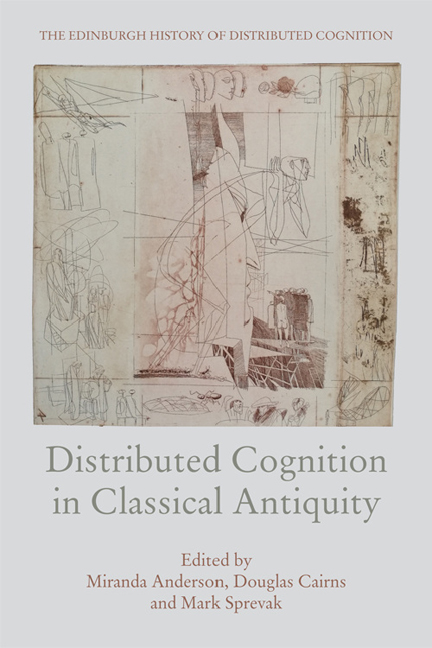Book contents
- Frontmatter
- Contents
- List of Illustrations
- Series Preface
- Miscellaneous Frontmatter
- 1 Distributed Cognition and the Humanities
- 2 Distributed Cognition and the Classics
- 3 Physical Sciences: Ptolemy's Extended Mind
- 4 Distributed Cognition and the Diffusion of Information Technologies in the Roman World
- 5 Mask as Mind Tool: A Methodology of Material Engagement
- 6 Embodied, Extended and Distributed Cognition in Roman Technical Practice
- 7 Roman-period Theatres as Distributed Cognitive Micro-ecologies
- 8 Cognition, Emotions and the Feeling Body in the Hippocratic Corpus
- 9 Enactivism and Embodied Cognition in Stoicism and Plato's Timaeus
- 10 Enargeia, Enactivism and the Ancient Readerly Imagination
- 11 Group Minds in Classical Athens? Chorus and Dēmos as Case Studies of Collective Cognition
- 12 One Soul in Two Bodies: Distributed Cognition and Ancient Greek Friendship
- 13 Distributed Cognition and its Discontents: A Dialogue across History and Artistic Genre
- Notes on Contributors
- Bibliography
- Index
12 - One Soul in Two Bodies: Distributed Cognition and Ancient Greek Friendship
Published online by Cambridge University Press: 12 November 2019
- Frontmatter
- Contents
- List of Illustrations
- Series Preface
- Miscellaneous Frontmatter
- 1 Distributed Cognition and the Humanities
- 2 Distributed Cognition and the Classics
- 3 Physical Sciences: Ptolemy's Extended Mind
- 4 Distributed Cognition and the Diffusion of Information Technologies in the Roman World
- 5 Mask as Mind Tool: A Methodology of Material Engagement
- 6 Embodied, Extended and Distributed Cognition in Roman Technical Practice
- 7 Roman-period Theatres as Distributed Cognitive Micro-ecologies
- 8 Cognition, Emotions and the Feeling Body in the Hippocratic Corpus
- 9 Enactivism and Embodied Cognition in Stoicism and Plato's Timaeus
- 10 Enargeia, Enactivism and the Ancient Readerly Imagination
- 11 Group Minds in Classical Athens? Chorus and Dēmos as Case Studies of Collective Cognition
- 12 One Soul in Two Bodies: Distributed Cognition and Ancient Greek Friendship
- 13 Distributed Cognition and its Discontents: A Dialogue across History and Artistic Genre
- Notes on Contributors
- Bibliography
- Index
Summary
It is said that when Aristotle was asked, ‘What is a friend?’ (τί ἐστι φίλος;), he replied: ‘One soul dwelling in two bodies’ (μία ψυχὴ δύο σώμασιν ἐνοικοῦσα). So wrote Diogenes Laertius (5.1.20), who composed biographies of the ancient Greek philosophers in the third century ce. A similar definition is found in Cicero's essay On Friendship (81), when he says that a human being naturally ‘both loves himself and seeks out another whose mind [animus] he may so mingle with his own as almost to make one mind out of two’ (‘et se ipse diligit et alterum anquirit, cuius animum ita cum suo misceat ut efficiat paene unum ex duobus’). Cicero, with Roman practicality, inserted the qualifier ‘almost’ (paene), but even so the idea is startling if taken literally, as I believe that Aristotle, at least, intended. Similarly, the formula ‘another self’, which Aristotle applies to a friend at least half a dozen times in his treatises and is also echoed by Cicero (again modified by the unreal conjunction: ‘as though the friend is both another and the same’, ‘est enim is qui est tamquam alter idem’, 80), suggests that friends, although they are clearly distinct entities (hence ‘another’), are in some sense nevertheless one and the same (the meaning of idem).
In this chapter, I argue that Aristotle's account of friendship in fact anticipates, and in certain ways even goes further than, aspects of the theory of distributed cognition. As Yvonne Rogers, in ‘A brief introduction to distributed cognition’ (1997), explains: ‘A general assumption of the distributed cognition approach is that cognitive systems consisting of more than one individual have cognitive properties that differ from those individuals that participate in those systems.’ The notion of distributed cognition has been applied to tasks that are undertaken jointly by a group, for example piloting a ship, where no one person may have access to all the data needed to determine the proper course, and to the use of external props in making calculations, as when we do arithmetic sums or division on paper or on a blackboard that we could not do just in our heads (Rogers provides a crisp summary of such cases).
- Type
- Chapter
- Information
- Distributed Cognition in Classical Antiquity , pp. 213 - 228Publisher: Edinburgh University PressPrint publication year: 2017



